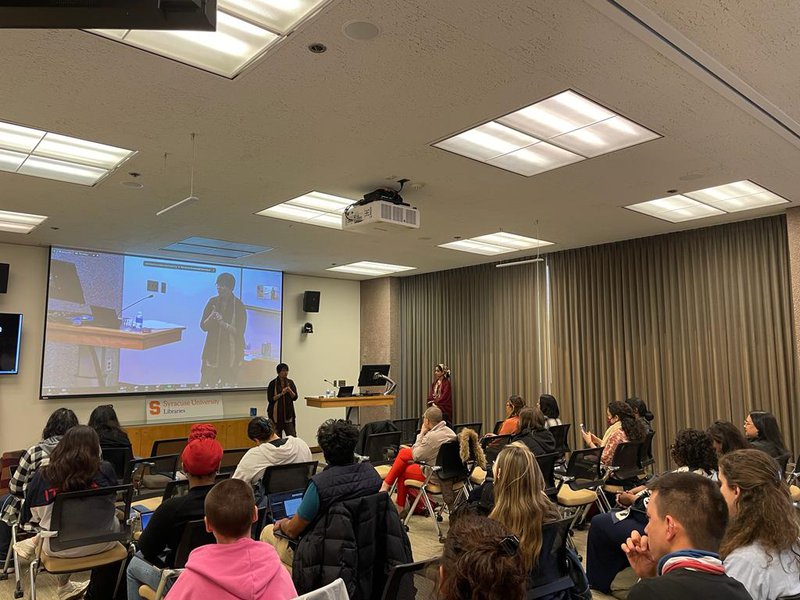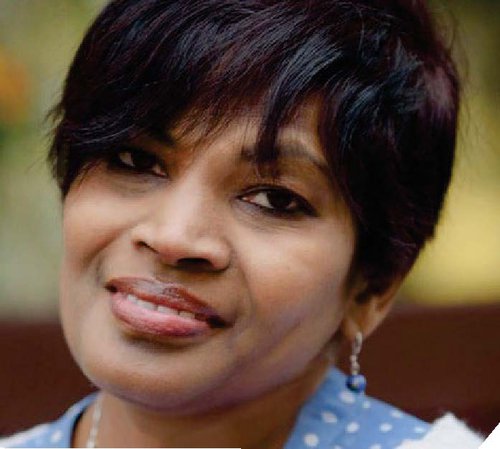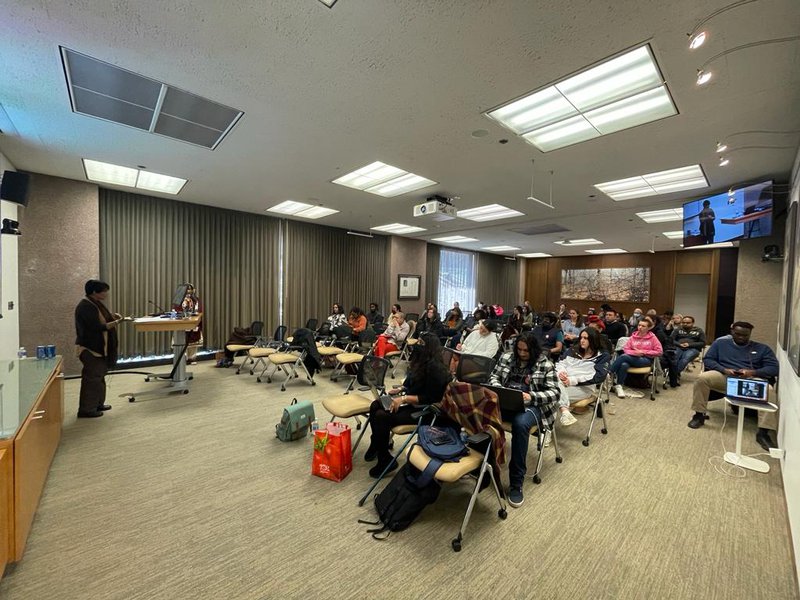Raising Awareness to End Caste Discrimination
April marks Syracuse University’s second Dalit History Month campus observance with a lecture and graduate student workshop bringing visibility to caste-based oppression.

Dalit History Month activities included a presentation by social justice advocate Roja Suganthy-Singh, professor at St. John Fisher University.
In 2015, a group of civil rights activists from India marched across 16 cities in North America to raise awareness about an issue many Americans may not be familiar with – caste discrimination. Originating in ancient India, caste is a form of ongoing structural oppression that divides people into categories at birth, and members of Dalit communities, formerly known as Untouchables, continue to face prejudice, discrimination and violence.
Though formally banned in India, caste discrimination remains an ongoing problem around the world, often following people who emigrate from India to other countries. Members of Dalit communities living in the United States routinely continue to encounter caste-based discrimination, including verbal, sexual and economic violence, from members of privileged castes in the diaspora.
Dalits and other individuals of oppressed caste identities encounter such discrimination in colleges, universities, schools, housing and employment, prompting calls for explicit policies against it, says social justice advocate Roja Suganthy-Singh (below), professor at St. John Fisher University in Rochester, NY, who recently spoke on this topic at Syracuse University.

Noting in her remarks that those who discriminate according to caste do so in the knowledge there are no institutional or legal policies to hold them accountable, Suganthy-Singh called on Syracuse University to implement a policy against caste-based discrimination and to “take a historic stand to ensure the safety of Dalits and all other vulnerable groups in the USA.”
Inspired by Black History Month, Dalit civil rights activists came together to declare April as Dalit History Month (DHM) to commemorate and celebrate the intellectual legacy, activism, leadership, lives and work of caste-oppressed people. Over the last eight years the initiative has gained momentum, with a major triumph coming earlier this year when Seattle, Washington, became the first U.S. city to create an ordinance banning discrimination based on caste.
Several higher education institutions, such as Brandeis University, Brown University, California State University, Colby College, Harvard University and the University of California, have also moved to include caste as a protected category in their anti-discrimination policies.
“Instating a policy against caste-based discrimination at Syracuse University is an urgent need of the hour,” says Suganthy-Singh, who was speaking at the University’s DHM event. “Caste is the begetter of racism and all other ‘isms’ that dehumanize others on the unthinkable irrational prerogative belief that some people are born superior.”
Himika Bhattacharya, associate professor and department chair of women’s and gender studies in the College of Arts and Sciences, organized and hosted the inaugural DHM event at SU in April 2022, which was attended by nearly 150 people with individuals joining from across North America and India. She began hosting this annual event in hopes of raising awareness about caste oppression and advocate for policy against caste discrimination at the Syracuse campus.
Graduate Students Lead the Effort
This year’s DHM events were led by three graduate co-organizers: Poonam Argade, Taveeshi Singh and Bramsh Khan, who are all students in the Department of Women’s and Gender Studies and the Maxwell School’s social science Ph.D. program. The student organizers say that observing Dalit History Month is an opportunity for the University community to learn about the rich history of Dalit peoples' resistance against caste oppression, and the ongoing efforts to address caste discrimination across higher education campuses in the United States and internationally.
“The inaugural DHM programming last year reinforced for me that our students need many more events addressing Dalit feminist interventions against caste,” says Bhattacharya. “In the absence of an understanding of caste socio-politically, and federal legal recourse, members of caste-oppressed communities on our campus as in the rest of the country continue to be vulnerable to caste discrimination. What we are trying to do here is to build familiarity with yet another form of structural oppression, that of caste, and to get this urgent issue addressed on our campus. Explicitly incorporating policy against caste discrimination on our campus would be a significant emancipatory political move against all forms of systemic injustice.”
By bringing these conversations to the forefront through events such as the DHM observance, the group is hopeful that Syracuse University will soon join other higher education institutions by incorporating caste as a protected category in their anti-discrimination policy.

2023 was the second year of DHM programming at Syracuse University.
The DHM lecture on April 3 with Suganthy-Singh was attended by over 100 people. Her public lecture, titled Earthy Humanness: Dalit Women’s Activism and Performance Intersectionality, explored the complex intersections of caste, class, gender, religion and tradition in relation to Dalit women in Tamil Nadu, India. From mandating marriage between members of the same caste to sexual violence against caste-oppressed women, gender-based oppression has reinforced caste hierarchies. Suganthy-Singh’s work looks at how caste and gender come together in shaping the experiences of violence that women in Tamil Nadu, India experience, and how women negotiate and resist that violence and work against gender and caste oppression at once.
Organizers also held a virtual graduate workshop on April 5, titled Dalit Feminist Activist Research.
The DHM lecture and workshop are co-sponsored by: Social Science Ph.D. Program, Department of Religion, Native American and Indigenous Studies, Department of African American Studies, Department of Sociology, Syracuse University Humanities Center, South Asia Center, CODE^SHIFT, Department of Art & Music Histories, The Graduate School, Office of Strategic Initiatives, Engaged Humanities Network and Democratizing Knowledge.
